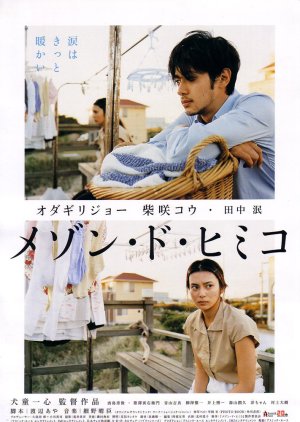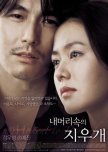
Take note that I watched the second half of the film without subtitles and relied on my very little Japanese. But despite that, the film isn't short of what it intends to do. The contrast is particularly strong here.
The narration straight-up unfolds the narration and the setting. And we are introduced to Saori (Kou Shibasaki) who's always in a scowl, looks pissed and feels frustrated. That frustration bubbles up when the she starts working at the House of Himiko.
And the film takes time to get to know the characters through Saori's eyes. Hence, it's not a narrative that just focuses on homosexuality alone but also how others come to accept them. Saori's hatred is apparent. She refuses to hide her anger. Her disgust. She lets it out. To the people there. To her father (Min Tanaka). To Haruhiko (Joe Odagiri). But like Saori, these characters don't flutter. They remain themselves.
The film magnifies how people put on this wall, creating their own disillusionment and why this exists. Haruhiko tries to act together. But eventually breaks down later. Saori hates her father for leaving her and her mother but doesn't really take the time to know why, standing by the wall she built—that wall of hatred.
The House of Himiko acknowledges that its characters are not perfect but it also looks at these choices with reason and forgiveness. By looking at the backstory of these gay men, it gives them a backbone, making their stories understandable. Undeniably, the film does still have tacky stereotypes of dance number, cosplay and pretty boys. But ultimately, these stereotypes do not hinder the characters and what the film wants to show.
Kou Shibasaki here, barefaced, deglamourized is able to show her versatility as an actress. In the beginning, her face is full of utter distain, disgust. But later on, we see her smile and dance. Min Tanaka, despite his few lines gives an amazing performance. He embodies a seductive yet masculine look despite being a dress. He has power and he holds it right.
Of course I am fangirling over Joe Odagiri. And I cannot believe he was already 29 in this film. I refuse to believe it. But the heartthrob's character here is nothing short of Odagiri's trademark of a quiet, charismatic damaged soul.
Perhaps the lack of subtitles at the second half of the film did left me with question marks. But I gathered that the film's focus on sexuality doesn't only relay on its gay characters but if sexual tension is enough to form a relationship on Saori's part. I mean, I wouldn't be able to resist Joe Odagri too.
Vond je deze recentie nuttig?








































